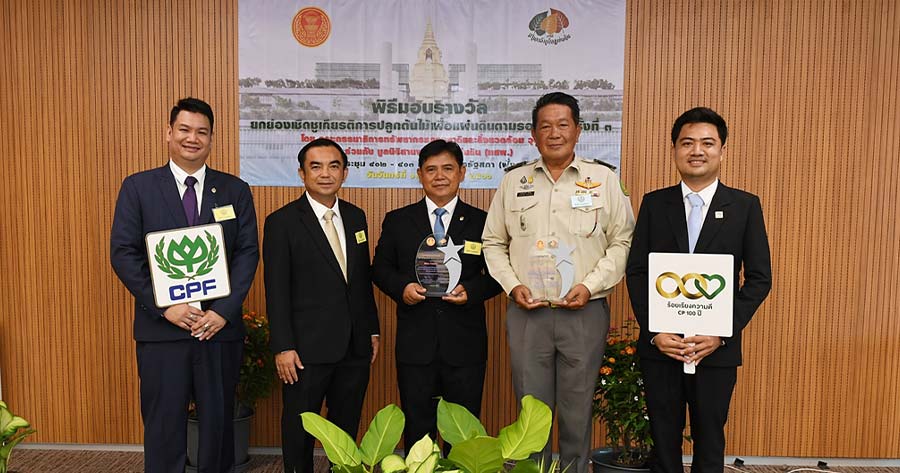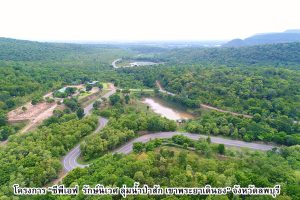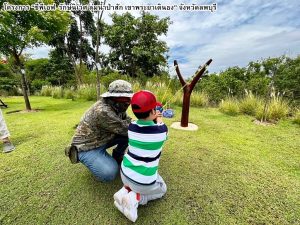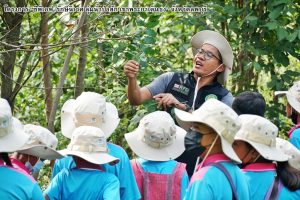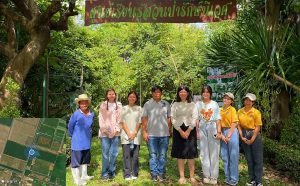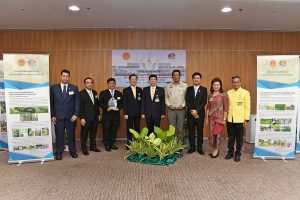CP Foods is praised by Thailand’s Senate Standing Committee on Natural Resources and Environment in recognition of the company’s effort on growing plants in a bid to enhance forest areas in Thailand coupled with improving quality of life of residents living surrounding the forests. This help ensure food security as the forest is foundation of biodiversity and sustainable quality water conservation. Two award winning projects are.
1. The Rak-Nives Project in Kamphaeng Phet Agricultural Village is a model for community reforestation in a pig farm for almost 20 years and designated as a learning center for interests.
2. The CPF Rak-Nives Khao Phraya Doen Thong project is a collaboration focused on the reforestation and recovery of watershed forests in the central part of Thailand. This project has had a significant impact on tangible reforestation efforts.
The Senate Standing Committee on Natural Resources and Environment bestowed honorary awards for two tree-growing projects to Charoen Pokphand Foods Company Limited (CP Foods) in recognition of its efforts to boost green areas following the late King Bhumibol’s Footsteps. These two projects aim to enhance the country’s green area and strengthen Thailand’s economy, society, and environment.
Two award-winning tree-growing projects have been co-founded and implemented by CP Foods. These projects comprise the Learning Center for the Rak-Nives Project in Kamphaeng Phet Agricultural Village in Tambon Thepnakorn in Kamphaeng Phet province and the CPF Rak-Nives Khao Phraya Doen Thong project in the Pasak watershed forest in Lopburi province.
Pichet Yaikansai, Head of Kamphaeng Phet Agricultural Village, and Thanompong Sungthoop, head of the Forest Restoration project at Khao Phraya Doen Thong project of the Royal Forest Department in Saraburi province, received the award on behalf of the projects from Gen. Surasak Karnjanarat, Chairman of the Committee on Natural Resources and Environment.
Dr. Amphon Jindawatthana, a consultant of the Committee and the chairman of the working group of the Planting Trees for the Nation project, said the award had been organized by the Project on Planting Trees for the Nation, Following the late King Bhumibol’s Footsteps, and the Collaborating Forces for the Country Foundation under The Senate Standing Committee on Natural Resources and Environment. This year marks the third year of the award presentation to praise individuals or projects’ efforts in encouraging tree growth and promoting local economic development in accordance with the Sufficiency Economy Philosophy.
The award committee realized that the forest conservation and restoration at Khao Phraya Doen Thong, undertaken by the Royal Forest Department with the support of CP Foods, has turned a drought-prone and degraded forest into a greener forest within 10 years. Meanwhile, the Rak-Nives Project in Kamphaeng Phet Agricultural Village has planted trees in the swine farm areas using natural methods. The achievements of both projects have been earned through ongoing support and collaboration from CP Foods.
Pichet Yaikansai said the project is Thailand’s first model of community reforestation in a pig farm, following CP Foods’ Green Farm approach, which focuses on social responsibility and eco-friendly swine farming. Since 2014, forest conservation with community participation has resulted in the growth of more than 25,000 trees on 30 rai of land (equivalent to 12 acres), including 210 rare and valued species trees. The project has embraced the circular economy principle in caring for the forest by recycling treated water from the biogas system and using pig manure fertilizer for trees. Currently, the forest has become a learning center that applies QR Codes for self-learning by visitors, with various programs developed to cater to the different interests of visitors.
Thanomphong Sangthoop said that the CPF Rak-Nives Khao Phraya Doen Thong project was initiated and sponsored by CP Foods in collaboration with the Royal Forest Department’s Natural Resources Management Bureau in Saraburi province and the residents living surrounding the forest in 2016, successfully conserving 7,000 rai (equivalent to 2,767.5 acres) of watershed reforestation. The project has adopted four methods to ensure the success of forest conservation, which include growing trees with extensive care, cultivating plants for reforestation, encouraging natural plant growth, and allowing forest recovery naturally. These four efforts have contributed to a faster recovery of the forest compared to the natural recovery methods.
Additionally, the project also encourages community participation in safeguarding the forest while supporting the villagers to grow vegetables and engage in fish hatchery activities to ensure food security for the communities nearby the forest.

